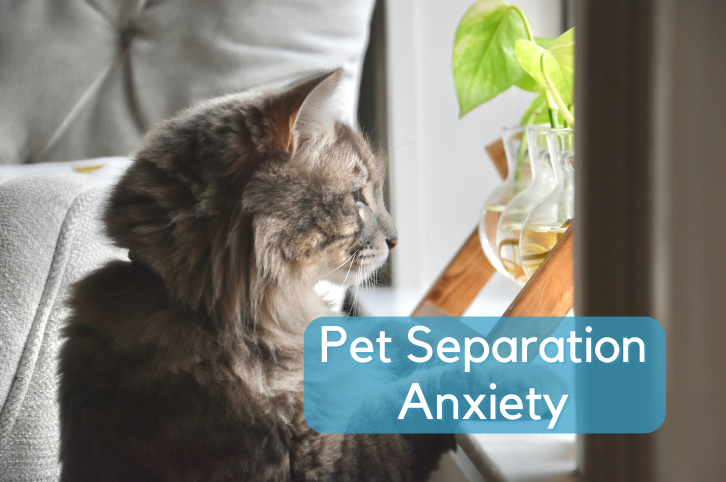Upcoming Autumn
Some of us can’t wait while others are passionately embracing the last official month of summer. Within a month, most of us will be back to a busy school year schedule. As families, we’ll be out of the house for hours at a time, leaving the pets who’ve grown accustomed to our presence over the summer months to adjust to longer days by themselves.
For our part, we’ll miss them, but they’re home alone without us for comfort or company. Some pets can manage this separation by napping the day away while others are uncomfortable. Some pets even develop anxiety when their people are away all day.
Your Pet Might Be Struggling If They…
Every pet is different, but there are some common signs that your pet is struggling to adapt to being home alone for longer periods of time. Cats and dogs exhibit different symptoms of separation anxiety. Cats may display more subtle symptoms than dogs. Cats might:
- Groom themselves obsessively
- Urinate or defecate outside their litter box
- Vomit more frequently
- Claw or scratch
- Eat more or not eat at all
- Try to escape
- Become extremely happy or excited to see you when you get home
- Vocalize excessively or in new ways
Dogs usually express their anxiety more openly. They might:
- Damage objects in the house or even the house itself
- Regress in house training or begin having accidents in the house
- Bark
- Howl
- Pace
- Drool excessively
- Lick paws (or other body parts) more than usual
- Begin eating feces
All of these can be signs of separation anxiety, but these lists might not encompass all your pet’s behavior. You know your pet best, so you’ll know if their behavior changes.
How To Help Your Pet
We have to work and go to school. It’s inevitable, especially if we want to keep our pets in the lifestyle to which they’ve become accustomed. If your pet is experiencing signs of separation anxiety, or you’re watching them pace, become destructive, or anything out of the ordinary via a camera in your home, there are ways to help them.
There are several things that you can do for both dogs and cats to make their separation anxiety less acute. You can:
- Hide treats around the house for them to find while you’re gone
- Provide toys that are mentally stimulating including snuffle mats or interactive toys
- Play calming music
- Leave the television on and tuned to something your pet enjoys
- Provide them with a safe place to go if they need to (crate or another spot)
- Maintain a consistent routine
- Have a pet sitter stop by mid-day
- Give your pet lots of love and affection when you get home
Dogs might also benefit from exercise before you leave home in the morning – a walk is helpful.
It’s important to give lots of love and affection when you get home, but you should still require good behavior from your pet. Don’t allow them to jump up on you or reward clingy behavior.
Homey Gnome Veterinary Clinic
Homey Gnome Veterinary Clinic in Oakdale, MN area can help with both medication and behavioral training recommendations if needed. We strive to provide compassionate care to your pets and understand their needs. Call us at 651-202-3388 so we can help.


